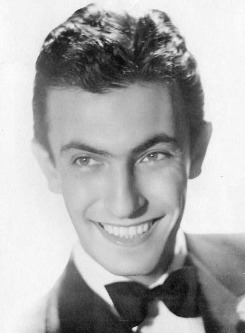Eddy Duchin (Edwin Frank Duchin)

Eddy Duchin was born on April 1, 1909 in Cambridge, Massachusetts to Bessarabian Jewish immigrants, Tillie (née Baron) (1885–March 21, 1962) and Frank Duchin (June 2, 1885–?). He was originally a pharmacist before turning full-time to music and beginning his new career with Leo Reisman’s orchestra at the Central Park Casino in New York, an elegant nightclub where he became hugely popular in his own right and eventually became the Reisman orchestra’s leader by 1932. He became widely popular thanks to regular radio broadcasts that boosted his record sales, and he was one of the earliest pianists to lead a commercially successful large band. Playing what later came to be called “sweet” music rather than jazz, Duchin’s success opened a new gate for similarly styled, piano-playing sweet bandleaders such as Henry King, Joe Reichman, Nat Brandwynne, Dick Gasparre, Little Jack Little, and particularly Carmen Cavallaro (who acknowledged Duchin’s influence) to compete with the large jazz bands for radio time and record sales. Eddy Duchin had no formal music training—which was said to frustrate his musicians at times—but he developed a style rooted in classical music that some saw as the forerunner of Liberace’s ornate, gaudy approach. Still, there were understatements in Duchin’s music. By no means was Duchin a perfect pianist, but he was easy to listen to without being rote or entirely predictable. He was a pleasing stage presence whose favourite technique was to play his piano cross-handed, using only one finger on the lower hand, and he was respectful to his audiences and to his classical influences. Duchin would often use beautiful, soft-voiced singers such as Durelle Alexander and Lew Sherwood to accommodate his sweet and romantic songs, giving them extra appeal and making them more interesting.
Eddy Duchin’s 1938 release of the Louis Armstrong song “Ol’ Man Mose” (Brunswick Records 8155) with vocal by Patricia Norman caused a minor scandal at the time with the lyric “bucket” being heard as “fuck it.” Some listeners conclude that there is no vulgarism uttered, while others are convinced that Norman does say “fuck” (which would explain one of the band members laughing delightedly after Norman seems to chirp, “Awww, fuck it… fuck-fuck-fuck it!”). The “scandalous” lyrics caused the record to zoom to #2 on the Billboard charts, resulting in sales of 170,000 copies when sales of 20,000 were considered a blockbuster. The song was banned after its release in Great Britain. The notorious number can be heard on a British novelty CD, Beat the Band to the Bar. Eddy Duchin entered the U.S. Navy during World War II, serving as a combat officer in a destroyer squadron in the Mediterranean and Pacific. He attained the rank of lieutenant commander (O4). Duchin’s military awards included the Navy Commendation ribbon with Combat “V”, Combat Action ribbon, American Area Campaign medal, the European-Africa-Middle Eastern Area Campaign medal, the Asiatic-Pacific Area Campaign medal, and the World War II Victory medal. After his discharge from the military, Duchin was unable to reclaim his former stardom in spite of a stab at a new radio show in 1949. On February 9, 1951, Eddy Duchin died at age 41 at Memorial Hospital in Manhattan of acute myelogenous leukemia. He was cremated, and his ashes were scattered in the Atlantic Ocean.
Born
- April, 01, 1909
- USA
- Cambridge, Massachusetts
Died
- February, 09, 1951
- USA
- Manhattan, New York, New York
Cause of Death
- acute myelogenous leukemia
Other
- Cremated



